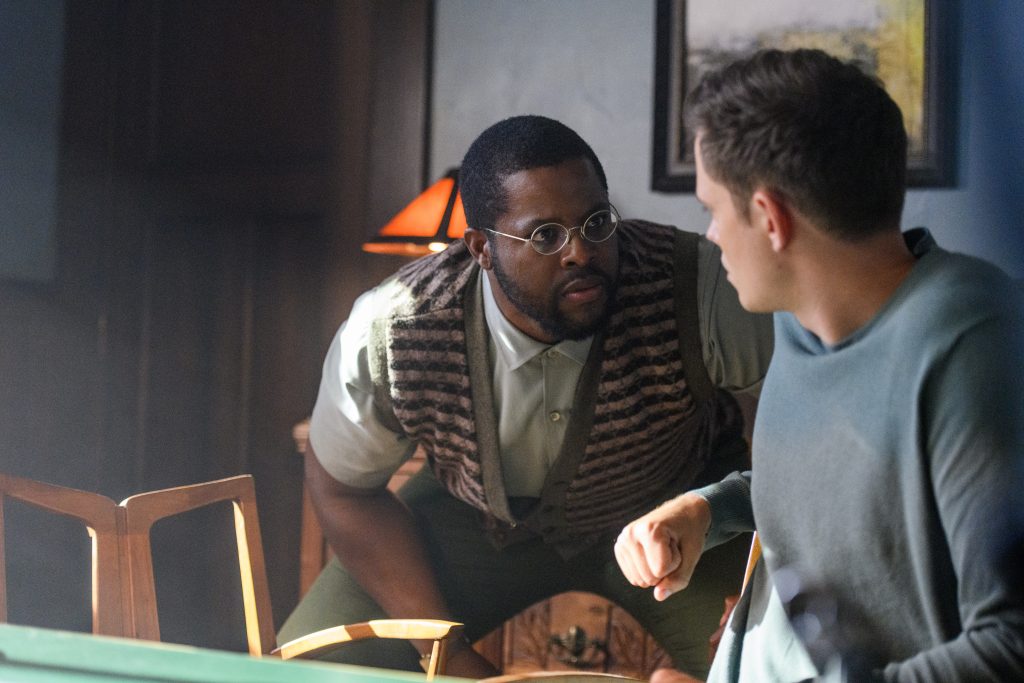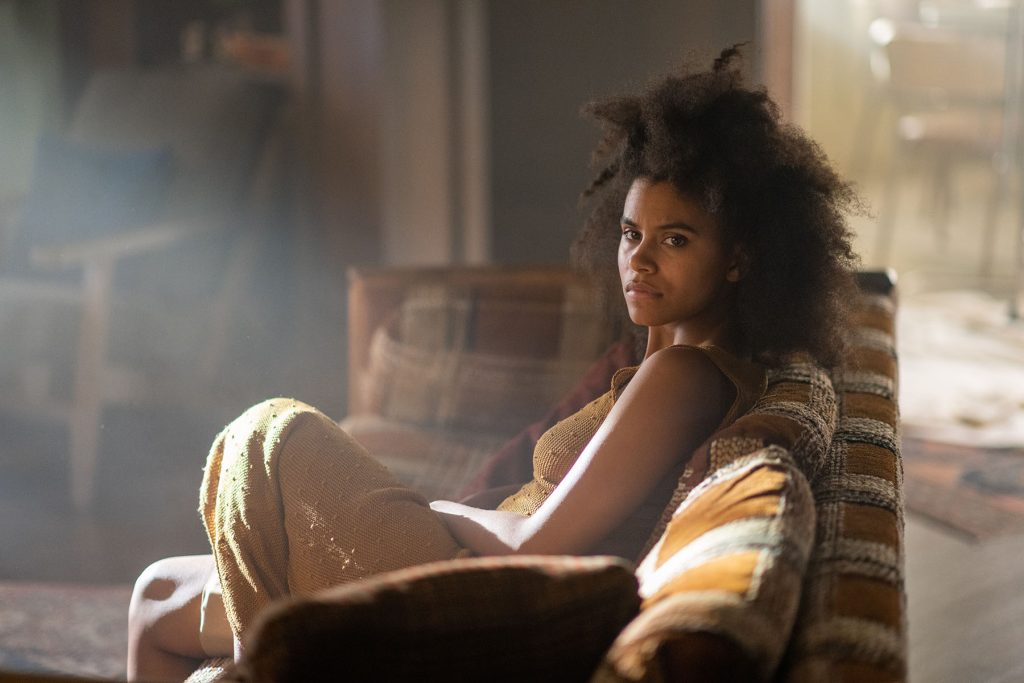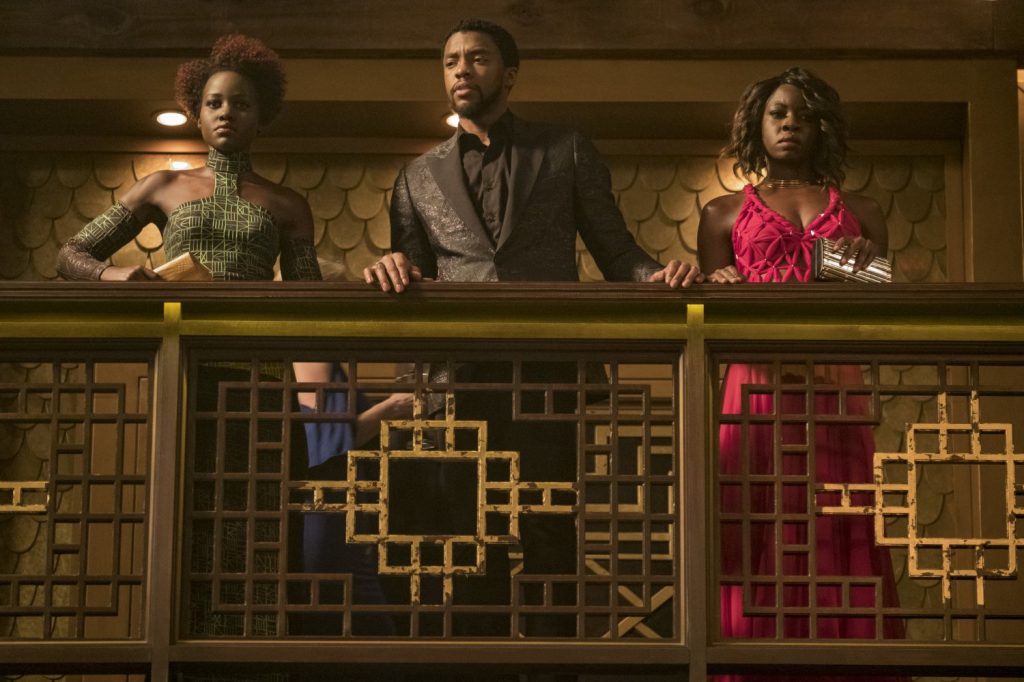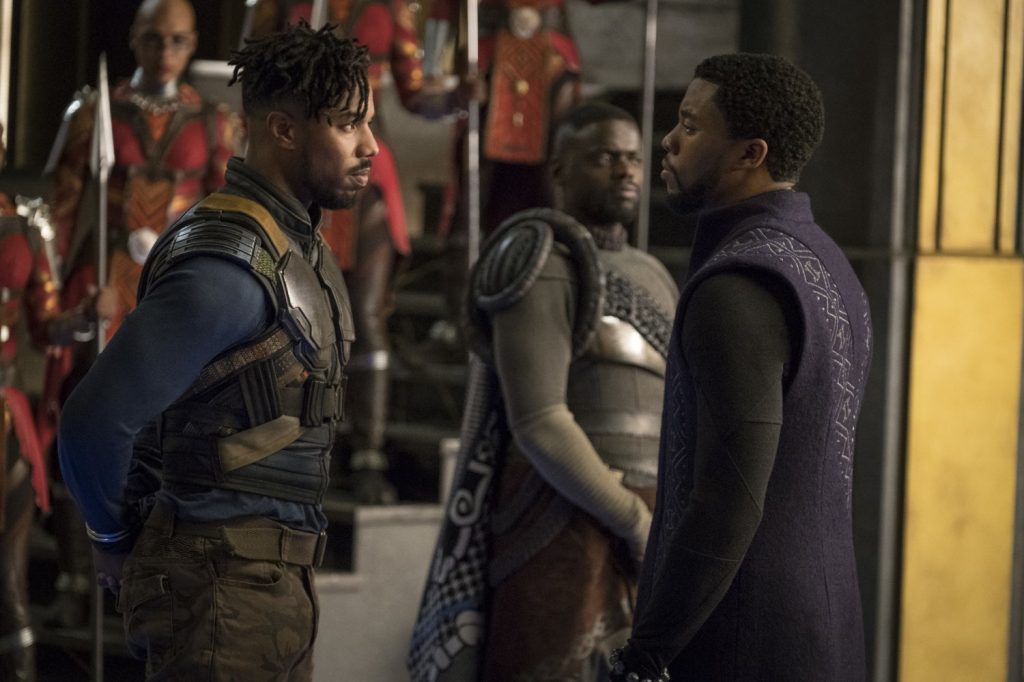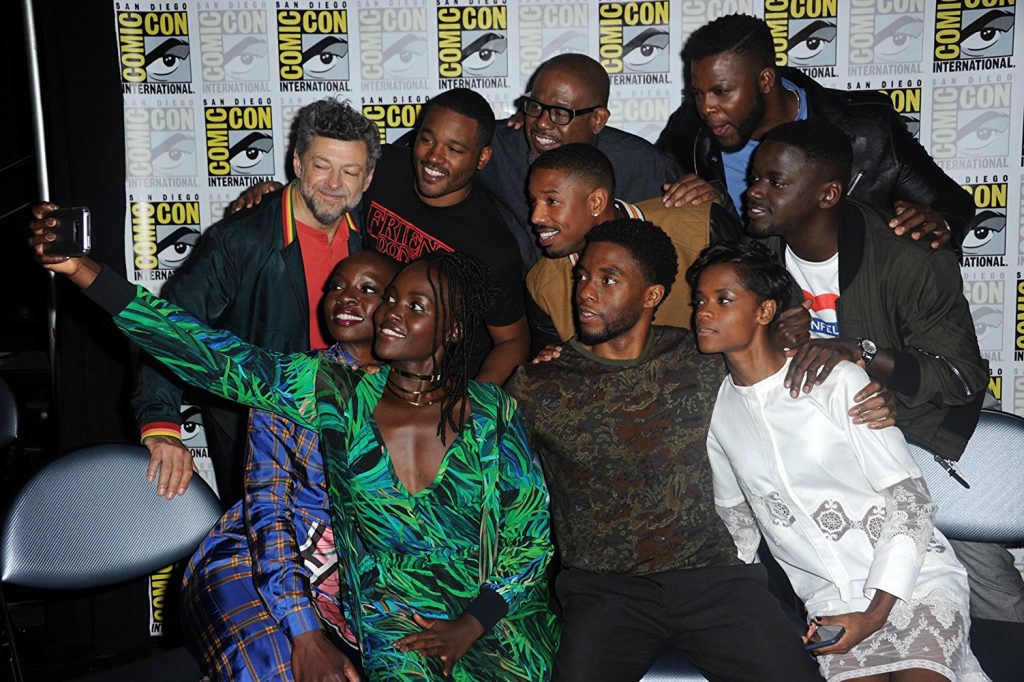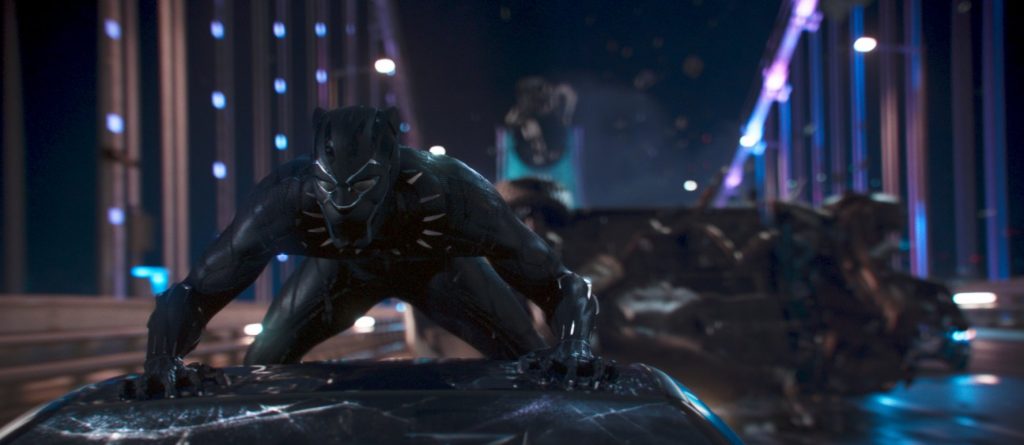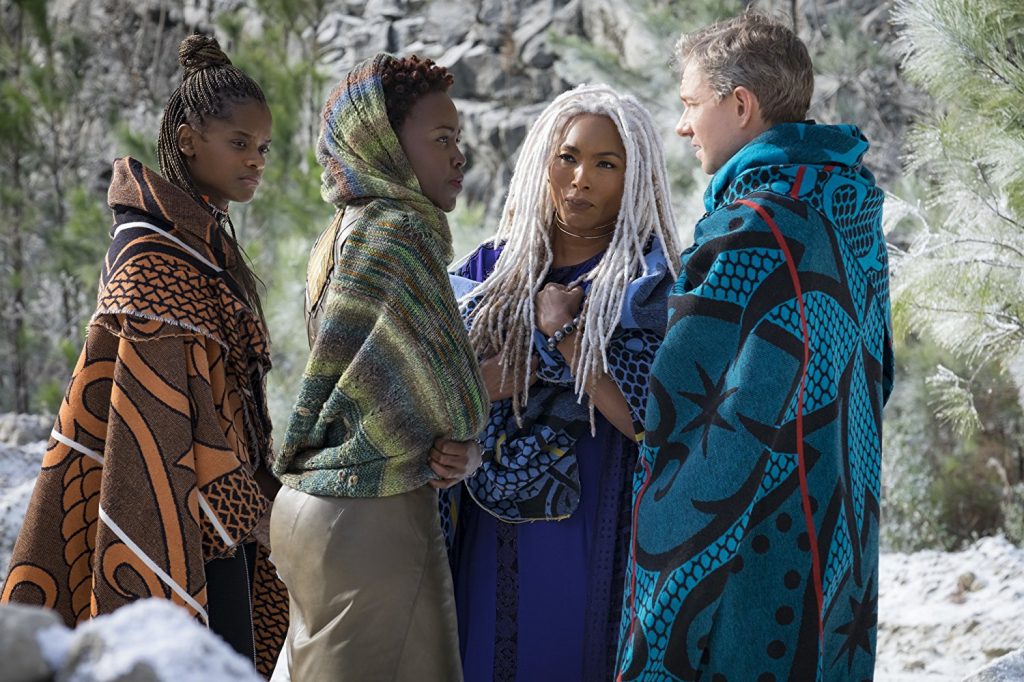November 8, 2022
by Carla Hay

“Black Panther: Wakanda Forever”
Directed by Ryan Coogler
Some language in French and Yucatec with subtitles
Culture Representation: Taking place in various parts of Earth, the superhero action film “Black Panther: Wakanda Forever” features a racially diverse cast of characters (black, Latino and white) representing the working-class, middle-class and royalty.
Culture Clash: After the death of King T’Challa, the fictional African nation of Wakanda becomes under siege from various factions, including the secret underwater kingdom of Talokan, that want Wakanda’s help in obtaining the precious metal vibranium.
Culture Audience: “Black Panther: Wakanda Forever” will appeal primarily to people who are fans of the “Black Panther” franchise, the Marvel Cinematic Universe (MCU) and superhero movies that include multiculturalism issues.

In more ways than one, “Black Panther: Wakanda Forever” shows how healing from a tragedy can turn into a triumph. This top-notch sequel to 2018’s “Black Panther” is an epic story of grief, loyalty, greed and the resilience of the human spirit. “Black Panther: Wakanda Forever” should more than satisfy fans of the Marvel Cinematic Universe (MCU) and will inspire repeat viewings. Do people need to see “Black Panther” before seeing “Black Panther: Wakanda Forever”? No, but it certainly helps, especially in understanding the backgrounds of the characters who have the most poignant moments in this sequel.
Directed by Ryan Coogler (who co-wrote the “Black Panther: Wakanda Forever” screenplay with Joe Robert Cole), “Black Panther: Wakanda Forever” puts the women of the fictional African nation of Wakanda in the front and center of a story that also pays respectful tribute to Wakanda’s deceased King T’Challa, played by Chadwick Boseman in 2018’s “Black Panther.” Coogler directed and co-wrote (with Cole) the first “Black Panther” movie, which helps in keeping a consistent tone for “Black Panther: Wakanda Forever.”
The beginning of “Black Panther: Wakanda Forever” shows King T’Challa’s younger sister Princess Shuri (played by Letitia Wright) frantically trying to find a medical solution to save T’Challa, who is dying from an unnamed illness. (Boseman tragically died of colon cancer in 2020. He was 43.) All of Shuri’s efforts don’t work, and T’Challa passes away.
The people of Wakanda have an elaborate funeral for T’Challa that includes mourning his death and celebrating his life. Everyone is dressed in white for this event. At the end of the funeral, T’Challa’s casket floats up into the sky. As explained in the first “Black Panther” movie and in Marvel’s “Black Panther” comic books, Wakanda is a self-sufficient nation that is somewhat of a utopia and where supernatural things can occur. Wakanda is protected by an all-female army called the Dora Milaje.
One year after T’Challa’s death, Shuri and her mother Queen Ramonda (played by Angela Bassett) are grieving, but Shuri has had a more diffcult time trying to move on with her life. Shuri is a genius scientist who blames herself for not being able to find a medical cure that could have saved T’Challa. Much of Shuri’s storyline in “Black Panther: Wakanda Forever” has to do with Shuri’s grief and other traumatic things she experiences in the movie.
Meanwhile, Queen Ramonda has to contend with pressure from different entities that want Wakanda’s help in finding vibranium, a rare metal that has the power to harness kinetic energy. An early scene in the movie shows a regal and confident Ramonda at a United Nations meeting in Geneva, Switzerland, one year after T’Challa’s death. During this meeting with world leaders, Ramonda is told that the United States is disappointed that Wakanda has not shared resources in the quest to find vibranium.
However, Wakanda (a self-sufficient nation that is somewhat of a utopia) has a policy not to get involved in other nations’ politics, and Ramonda reiterates that fact. She also has members of Dora Milaje bring in some captives: several men who tried to invade one of Wakanda’s member facilities that handles vibranium. A flashback shows how members of the Dora Milaje captured these invaders. Ramonda’s sternly tells the assembled officials that she knows that a member state of the United Nations was probably behind this attack, and this capture serves as an “olive branch” warning for this attack not to happen on Wakanda again.
Meanwhile, a U.S. ship in the Atlantic Ocean has been looking for vibranium underwater. The ship then experiences something unexpected and bizarre. Crew members of the ship seem to go into a daze and start jumping off of the ship to their death. And then, a group of blue-skinned people rise out of the ocean and attack the ship. The attackers’ leader is dressed like a Mayan king and has wings on his feet that allow him to fly. Viewers later find out that his name is Namor (played Tenoch Huerta Mejía), and he’s the ruler of Talokan, a hidden nation under the sea.
One evening, back in Wakanda, Ramonda and Shuri have a heart-to-heart talk on a beach. Ramonda is concerned about Shuri’s emotional well-being because Shuri seems to be deeply depressed. Shuri tries to brush off her mother’s concerns. Ramonda says she has a secret about T’Challa that she wants to tell Shuri. But just as she’s about to tell Shuri, Namor appears out of the water.
Namor is not there to pay a friendly visit. He essentially tells Ramonda and Shuri that Talokan needs Wakanda’s help to defend themselves from extinction and to get vibranium. If Wakanda refuses to help, Talokan will declare war on the world, and Wakanda will be Talokan’s first target. A stunned Ramonda tells Namor that Wakanda does not get involved in other people’s wars and refuses to give in to his demand. Namor leaves and ominously says that he will return in one week.
Meanwhile, CIA operative Everett K. Ross (played by Martin Freeman) reprises his role from 2018’s “Black Panther.” Everett is an ally to Wakanda but he gets into conflicts about it with higher-ranking agent Valentina Allegra de Fontaine (played by Julia Louis-Dreyfus), who is pressuring Wakanda to cooperate with the U.S. government to find vibranium. Valentina (who communicates with a brittle, sarcastic tone) has another, more personal connection to Everett that is revealed in the movie.
Also reprising their roles from “Blank Panther” are Okoye (played by Danai Gurira), the courageous leader of the Dora Milaje; Ayo (played by Florence Kasumba), a powerful enforcer of the Dora Milaje; M’Baku (played by Winston Duke), the leader of Jabariland, Wakanda’s isolated region known for its snow and mountains; and Nakia (played by Lupita Nyong’o), who is the best spy in Wakanda’s history and T’Challa’s former love partner. New to the Dora Milaje team is Aneka (played by Michaela Coel), a high-ranking member.
During the course of the story, Shuri and Okoye travel to Haiti, where viewers find out that Nakia has been living for the past six years. In Haiti, Nakia has been working as a teacher of children in elementary school. Shuri and Okoye have to plead with Nakia to come back to Wakanda to help them, but Nakia is very reluctant to go back. Why did Nakia leave Wakanda? And why is Nakia reluctant to go back? Those questions are answered in the movie.
Wakanda also has another ally, who finds herself involved in this brewing war through no choice of her own. Her name is Riri Williams (played by Dominique Thorne), a brilliant 19-year-old MIT student and aspiring scientist. Riri and Shuri are thrown together in circumstances where they have to learn to work together. Riri is sometimes overwhelmed by the danger that comes her way, but she can be counted on to come up with helpful ideas. She has a sassy personality that is the comic relief in the movie.
Meanwhile, Namor has been assembling his own troops to prepare for war. His two main sidekicks are Talokan’s strongest warrior Attuma (played by Alex Livinalli) and Talokan’s most fearless warrior Namora (played by Mabel Cadena), who have unwavering loyalty to Talokan and their leader, Namor. At one point in the movie, viewers find out more about Talokan and Namor’s backstory to explain why he is on such a brutal revenge mission.
“Black Panther” won Academy Awards for its production design (led by Hannah Beachler) and its costume design (led by Ruth E. Carter), with Beachler and Carter both leading the same teams for “Black Panther: Wakanda Forever.” The production design for “Black Panther: Wakanda Forever” is even more elaborate and awe-inspiring, particularly in how Talokan was designed. (It looks like an underwater Mayan paradise inspired by Atlantis.) The costume design for “Black Panther: Wakanda Forever” is also Oscar-worthy, although many of the Dora Milaje costumes are understandably the same or similar to as they were in “Black Panther.”
“Black Panther: Wakanda Forever” has better visual effects than “Black Panther.” The cinematography is also an improvement over the first “Black Panther” movie, particularly when it comes to the scenes in Talokan and some of the camera angles during the fight scenes. Every action sequence looks believable, given the characters’ superpowers. But all of these dazzling components to the film would be wasted if the story wasn’t compelling and the acting performances weren’t up to par.
Shuri becomes the heart and soul of “Black Panther: Wakanda Forever,” as she comes to terms with T’Challa’s death; faces doubts and moral dilemmas about where he should put her loyalties; and sometimes clashes with her strong-willed mother Ramonda on decision to make about Wakanda’s future. Wright gives a standout performance in having to convey a wide myriad of emotions of someone who is the heir to the throne but has inner and exterior conflicts about her leadership, while living in the shadow of T’Challa and his legacy.
Bassett is also noteworthy in her performance as Romanda, who has to find a way to reconcile her pain with a possible new direction for Wakanda. Huerta Mejía a gives solid performance as the movie’s villain, who is alternately stoic and filled with rage. Namor isn’t the most fearsome villain of the MCU, but his backstory will make viewers see that underneath his anger is a lot of personal pain and pride for his people.
Because of the real-life death of Boseman, there are expected tearjerking moments when the movie shows flashbacks of T’Challa. There’s also the brief return of another major character from the first “Black Panther” movie, with the character appearing to Shuri in a vision. A mid-credits scene (there is no end-credits scene) in “Black Panther: Wakanda Forever” shines a bright light of hope for the future of Wakanda, but it’s with a bittersweet tone that T’Challa is immensely beloved and will always be missed.
Marvel Studios will release “Black Panther: Wakanda Forever” in U.S. cinemas on November 11, 2022.

